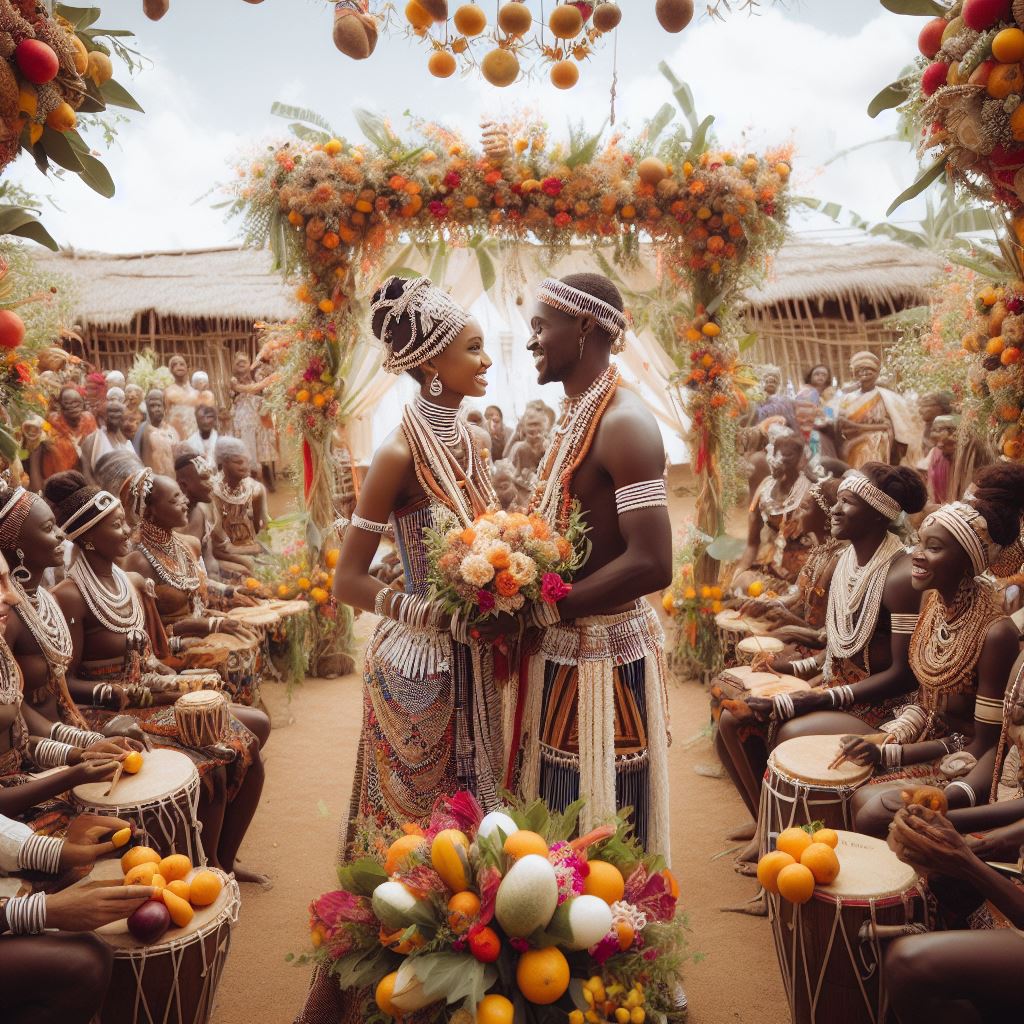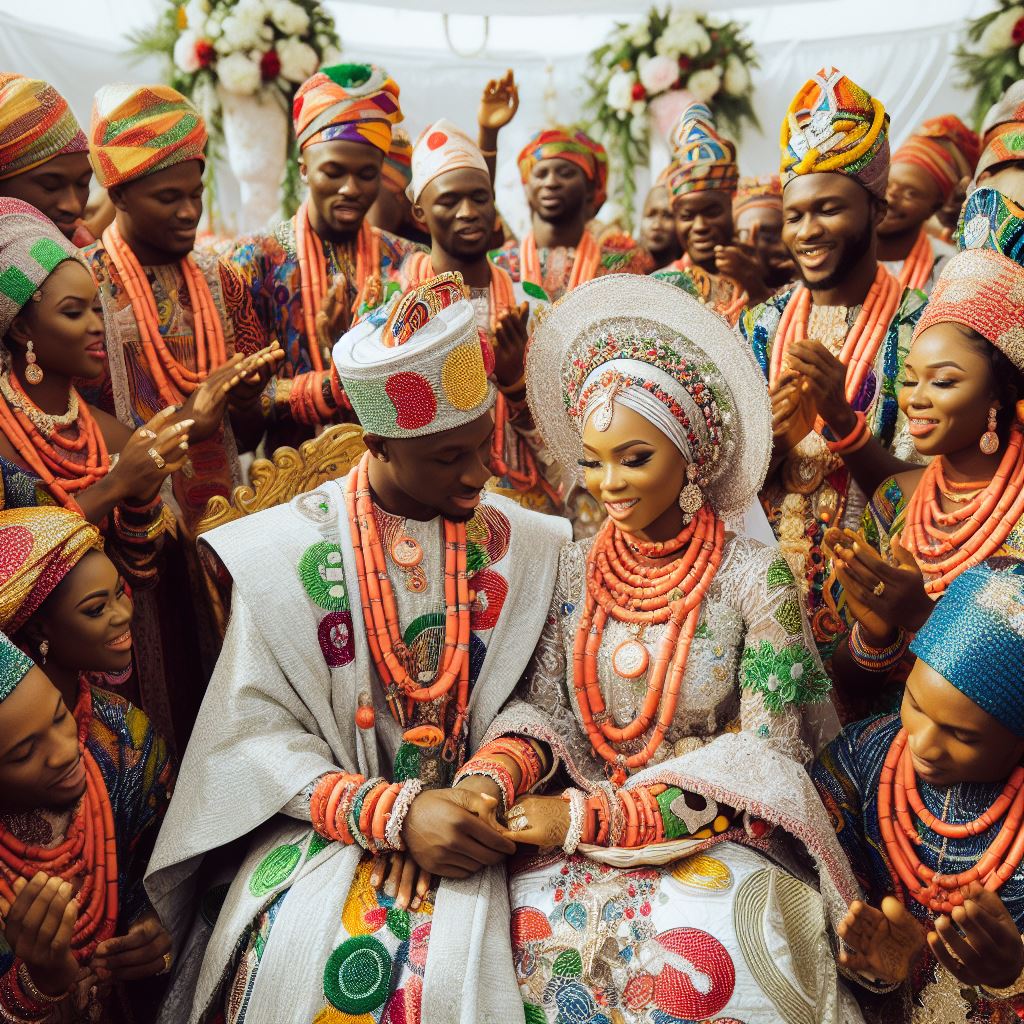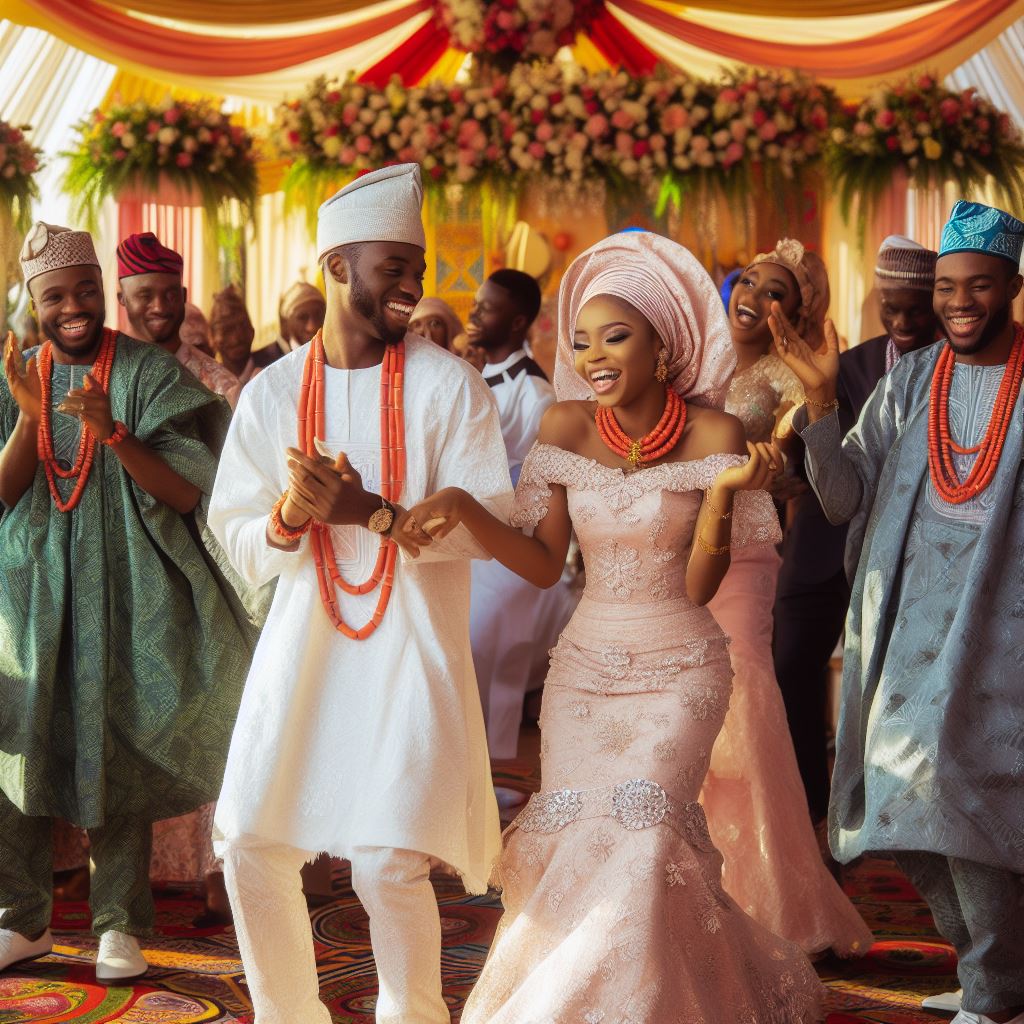Introduction
Brief Explanation of Inter-tribal Marriages
In Nigeria, inter-tribal marriages are a testament to love’s ability to transcend cultural boundaries, uniting individuals from diverse ethnic backgrounds.
Importance of Exploring Cultural Exchange and Unity
This section embarks on a journey to unravel the significance of inter-tribal marriages as catalysts for cultural exchange and unity.
Beyond being personal unions, these marriages serve as bridges connecting Nigeria’s myriad ethnic groups, sharing traditions, languages, and customs.
As we delve deeper into this exploration, we will uncover how inter-tribal marriages enrich the cultural mosaic of Nigeria.
By embracing diversity and celebrating unity, these unions pave the way for a more harmonious and interconnected nation.
Join us in this captivating exploration of love, culture, and unity within the context of inter-tribal marriages in Nigeria.
Understanding Inter-Tribal Marriages
Definition of inter-tribal marriages
Inter-tribal marriages refer to unions between individuals from different ethnic or tribal backgrounds.
Common reasons for inter-tribal marriages in Nigeria include love, compatibility, and the desire for cultural diversity.
Challenges faced by couples in inter-tribal marriages include language barriers, traditional practices, and family disapproval.
In Nigeria, inter-tribal marriages have become more common as society becomes more open-minded and accepting.
Common reasons for inter-tribal marriages in Nigeria
- Love: Love knows no boundaries, and many couples are drawn to each other regardless of their tribal backgrounds.
- Compatibility: Couples may find that they share similar values, beliefs, and interests, which makes them compatible despite their cultural differences.
- Cultural diversity: Some individuals deliberately seek out inter-tribal marriages to embrace and celebrate the richness of different cultures.
- Personal growth: Being in an inter-tribal marriage allows individuals to learn from and appreciate different perspectives, broadening their worldview.
- Breaking stereotypes: Inter-tribal marriages can challenge stereotypes and promote unity among different ethnic groups.
Challenges faced by couples in inter-tribal marriages
- Language barriers: Communication may be an issue as couples may speak different languages or dialects.
- Traditional practices: Each tribe has its own customs and traditions, which can create conflicts and misunderstandings.
- Family disapproval: Some families may oppose inter-tribal marriages due to cultural or religious differences.
- Identity crisis: Couples may struggle with establishing a unified identity that incorporates both of their tribal backgrounds.
- Prejudice from society: Some individuals may face discrimination and prejudice from others who disapprove of inter-tribal marriages.
- Parenting challenges: Couples may face difficulties in raising children, as they need to navigate the complexities of two different cultures.
- Resistance to change: Both partners may need to adapt to new customs, traditions, and ways of life, which can be challenging.
Inter-tribal marriages in Nigeria are a means of bridging cultures and promoting cultural diversity.
Although couples face challenges, such unions can also bring about personal growth and unity among various ethnic groups.
Love, compatibility, cultural diversity, and breaking stereotypes are some of the common reasons for inter-tribal marriages.
By understanding and embracing the challenges and benefits, couples can create a harmonious and enriched life together.
Read: Grace, Love, and Unity: Biblical Keys for Marriage
Benefits of Inter-Tribal Marriages
Inter-tribal marriages in Nigeria have numerous benefits that go beyond the union of individuals.
These marriages contribute to cultural diversity and enrichment, enhance unity and national integration, reduce tribalism and stereotypes, and enrich family values and traditions.
Cultural diversity and enrichment
Cultural diversity is one of the most significant benefits of inter-tribal marriages.
When individuals from different tribes come together through marriage, they bring their distinct cultural practices, beliefs, and customs.
This exchange of cultural values enriches the family environment and provides children with a broad perspective on different cultures.
Enhancement of unity and national integration
Furthermore, inter-tribal marriages enhance unity and national integration.
By marrying someone from a different tribe, individuals bridge the gap between tribes and foster a sense of unity and belonging to a larger national community.
This contributes to a more cohesive society and helps overcome divisions based on tribal identities.
Reduction of tribalism and stereotypes
Another advantage of inter-tribal marriages is the reduction of tribalism and stereotypes.
When two individuals from different tribes form a bond through marriage, they challenge negative stereotypes and prejudices associated with each other’s tribes.
This promotes understanding, empathy, and acceptance between tribes, leading to a more harmonious society.
Enrichment of family values and traditions
Moreover, inter-tribal marriages enrich family values and traditions.
In these marriages, couples have the opportunity to blend their cultural values and traditions, creating a unique family dynamic.
Children raised in such families benefit from exposure to different perspectives, expanding their understanding of the world and promoting tolerance and respect for various cultures.
Inter-tribal marriages also have personal benefits for individuals involved.
They provide an avenue for personal growth and learning, as individuals navigate the complexities of merging different cultural backgrounds.
This process promotes adaptability, communication, and understanding, which can strengthen the marital bond and contribute to individual development.
Additionally, inter-tribal marriages can have positive economic implications.
Marrying someone from another tribe often involves the exchange of goods and dowries, which can stimulate local economies and foster interpersonal relationships within communities.
These marriages can also contribute to cross-cultural business opportunities and collaborations, further boosting economic growth.
Read: The Beauty of Commitment: Top Bible Verses on Marriage
Cultural Challenges in Inter-Tribal Marriages
Inter-tribal marriages in Nigeria are a beautiful display of love that transcends cultural boundaries. However, these unions are not without their fair share of challenges.
In this section, we will explore some of the cultural obstacles that couples may encounter when bridging their diverse backgrounds.
1. Language barriers and communication issues
One of the most common challenges faced by inter-tribal couples is the language barrier.
Each tribe in Nigeria has its own unique language, and when two individuals from different tribes come together, communication can become a significant hurdle.
Misunderstandings and misinterpretations may arise, leading to frustration and an inability to express emotions effectively.
2. Different customs and traditions
Every tribe in Nigeria has its own distinct customs and traditions, which shape their way of life.
When individuals from diverse cultural backgrounds unite in marriage, they must navigate through these customs.
Understanding and respecting each other’s traditions is crucial to fostering harmony and avoiding conflicts that may arise due to differing cultural practices.
3. Different religious practices
Nigeria is a country with a wide range of religious diversity. It is not uncommon for inter-tribal couples to come from different religious backgrounds.
This can present challenges in terms of shared values and practices. Finding a common ground and mutual respect for each other’s beliefs is essential to maintaining a strong and unified relationship.
4. Conflicting family values and expectations
Family plays a crucial role in Nigerian culture, and each tribe has its unique set of values and expectations.
It is not uncommon for inter-tribal couples to face conflicts between their respective families concerning various aspects of married life, such as parenting styles, gender roles, and in-law relationships.
Balancing these conflicting expectations requires open and honest communication between partners.
To navigate these cultural challenges successfully, inter-tribal couples must approach them with patience, understanding, and compromise.
Here are some strategies couples can employ:
1. Communication and language learning
Couples should prioritize effective communication by investing effort into learning each other’s languages.
This can help bridge the gap between different cultural backgrounds and create a harmonious environment for communication.
2. Cultural exchange and education
Both partners should actively participate in learning about each other’s customs, traditions, and religious practices.
Regular discussions and participation in festivals and ceremonies can foster mutual understanding and appreciation for each other’s heritage.
3. Open dialogue and compromise
It is vital for couples to have open and honest conversations about their individual expectations, family values, and beliefs.
By understanding each other’s perspectives, they can find common ground and make compromises when conflicts arise.
4. Seeking support and guidance
Inter-tribal couples can benefit from seeking guidance from family, friends, or even professional counselors who can offer advice on navigating cultural challenges.
Building a support system can provide reassurance and guidance during difficult times.
Inter-tribal marriages in Nigeria face numerous cultural challenges, including language barriers, customs, religious differences, and conflicting family values.
However, by approaching these challenges with understanding, communication, and compromise, couples can bridge their cultural differences and create strong and thriving unions.
The key is to embrace the richness of each other’s heritage, while also fostering a sense of unity and shared values.
Read: Marriage and Divorce: What the Bible Really Says

Discover More: Bridging Cultural Gaps: Prayers for Intertribal Nigerian Marriages
Strategies for a Successful Inter-Tribal Marriage
In order to have a successful inter-tribal marriage, there are several strategies that couples can adopt.
Effective communication and compromise
Communication is key in any relationship, and it becomes even more important in an inter-tribal marriage.
Open and honest communication can help bridge the cultural gap and ensure that both partners feel understood and valued.
Additionally, couples must be willing to compromise and find solutions that work for both their cultural backgrounds.
Mutual respect and tolerance for cultural differences
In an inter-tribal marriage, partners must have a deep respect for each other’s cultural backgrounds. This includes respecting each other’s customs, traditions, and beliefs.
Tolerance for cultural differences is essential in order to avoid conflicts and misunderstandings.
Adoption of inclusive customs and traditions
Couples in inter-tribal marriages have the unique opportunity to create a diverse and inclusive family culture.
By adopting customs and traditions from both partners’ tribes, they can create a harmonious environment that celebrates their shared heritage.
Understanding and embracing each other’s religious practices
Religion plays a significant role in many cultures, and inter-tribal couples often come from different religious backgrounds.
It is important for partners to understand and respect each other’s religious practices. This may involve attending religious ceremonies together or finding common ground in their spiritual beliefs.
By implementing these strategies, couples can navigate the challenges of inter-tribal marriages and create a strong foundation for their relationship.
Effective communication and compromise allow them to find common ground and resolve conflicts. Mutual respect and tolerance for cultural differences foster understanding and acceptance.
Adoption of inclusive customs and traditions creates a sense of belonging for both partners. Finally, understanding and embracing each other’s religious practices promote unity and harmony.
It is important to acknowledge that inter-tribal marriages may face unique obstacles.
How these strategies are applied may vary depending on the specific tribes involved and the cultural dynamics at play.
However, the underlying principles of communication, respect, inclusion, and understanding are fundamental to any successful inter-tribal marriage.
Inter-tribal marriages have the potential to strengthen the social fabric of Nigeria by creating bonds across tribes and promoting unity.
These marriages can challenge stereotypes and prejudices by showcasing the beauty and richness of Nigeria’s diverse cultures.
By embracing inter-tribal marriages and supporting couples who choose to bridge cultures, Nigeria can foster a more inclusive and harmonious society.
Read: The Song of Solomon: Exploring Love and Marriage
Success Stories of Inter-Tribal Marriages: Inspiring examples of successful inter-tribal marriages in Nigeria
Inter-tribal marriages in Nigeria are often regarded as a bridge between cultures, bringing together individuals from different ethnic backgrounds and fostering unity.
While challenges may arise in such unions, there are many success stories that serve as beacons of hope and inspiration.
These stories shed light on the possibilities and lessons that can be learned from inter-tribal marriages.
Inspiring examples of successful inter-tribal marriages in Nigeria
One remarkable success story is the marriage of Emeka, an Igbo man, and Amina, a Hausa woman.
Despite initial reservations from their families due to cultural differences, they embarked on a journey of love and understanding.
Through open communication and mutual respect, they built a strong foundation for their marriage.
Emeka learned the Hausa language and embraced Amina’s customs, while Amina became immersed in Igbo traditions.
Today, they celebrate their diverse backgrounds and their children are raised to appreciate both cultures.
Another inspiring example is the story of Ibrahim, a Yoruba man, and Ngozi, an Efik woman.
Their marriage faced opposition from relatives who feared the loss of cultural heritage. However, Ibrahim and Ngozi persisted and demonstrated the power of love in bridging cultures.
They emphasized compromise and actively involved their families in the celebration of each other’s traditions.
Their perseverance paid off, as their families gradually warmed up to the idea and began to appreciate the beauty of their mixed heritage.
These success stories offer valuable lessons for those considering or already in inter-tribal marriages. Firstly, open communication is paramount.
Honest and respectful discussions about cultural expectations, values, and practices reduce misunderstandings and enhance harmony.
Secondly, both partners should actively engage in learning about and participating in each other’s cultures. This fosters empathy, appreciation, and creates a strong bond between families.
Lastly, compromising and finding common ground is crucial in resolving conflicts that may arise from cultural differences.
Lessons learned from these success stories
From these success stories, it is evident that inter-tribal marriages can be a source of unity and strength in Nigeria.
They dispel the notion that cultural differences are insurmountable obstacles and demonstrate that love and understanding can prevail.
These marriages serve as examples of how diversity can be celebrated rather than seen as a source of division.
Additionally, successful inter-tribal marriages contribute to national integration and unity in Nigeria.
By bridging cultures, these unions promote a sense of belonging and promote national cohesion.
They debunk ethnic stereotypes and prejudices, encouraging societal acceptance and fostering a more inclusive and harmonious society.
The success stories of inter-tribal marriages in Nigeria inspire and offer valuable lessons. They illustrate the power of love, communication, and compromise in building strong and lasting relationships.
These marriages serve as symbols of unity, national integration, and cultural appreciation, proving that inter-tribal unions can bridge the gaps between cultures and contribute to a more cohesive society.
Conclusion
Inter-tribal marriages play a vital role in bridging cultures in Nigeria. They promote understanding, tolerance, and unity among different ethnic groups.
By marrying someone from a different tribe, individuals can experience the richness and diversity of Nigerian culture firsthand.
These marriages also have numerous benefits, including the exchange of traditions, languages, and customs, which can enrich the lives of both partners.
Furthermore, inter-tribal marriages contribute to the reduction of ethnic prejudices and stereotypes, fostering a more cohesive society.
For those considering inter-tribal marriages, it is essential to embrace cultural diversity and remain open-minded.
Communication and understanding between partners are key in navigating the potential challenges that may arise.
The willingness to learn about and appreciate each other’s traditions will help build a strong foundation for a successful inter-tribal marriage.
Ultimately, inter-tribal marriages in Nigeria should be celebrated and encouraged, as they have the power to foster unity and create a more harmonious society.




